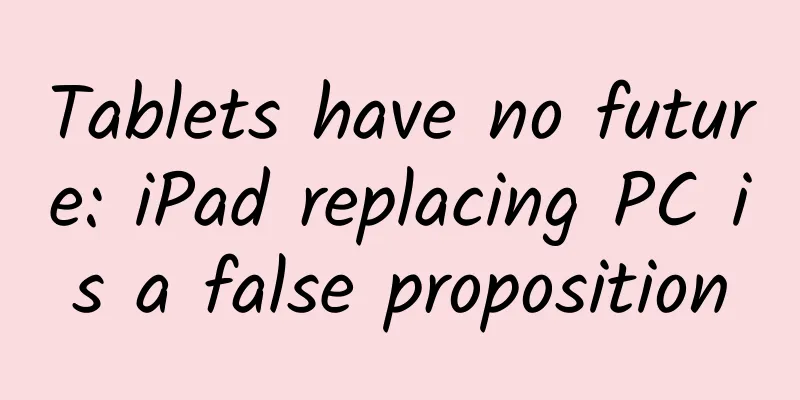Tablets have no future: iPad replacing PC is a false proposition

|
Did you notice this detail at the Apple new product launch a few days ago? Cook said that the iPad tablet computer, which was only launched in 2010, has surpassed the sales of any traditional giant's PC in the past twelve months (as of the third quarter of 2014). He emphasized that this is the result of taking into account all PC forms such as the competitors' laptops, desktops, all-in-ones, two-in-ones, etc. Obviously, this is sending two messages to the media/general consumers: First, iPad can be compared with PC, that is, tablet computer = PC. Apple equates iPad tablet with PC in terms of product form, implying that they will perform the same functions and meet the same needs (in the future). Second, decades of development of PCs have been easily surpassed by the iPad, which was only born a few years ago. This means that tablets are the future. Compared to Cook's description full of "marketing skills", Apple's financial report for Q3 2014 seems to explain more: First, why doesn't Apple compare its own Mac with the other party's PC? Once you compare, you will find that the sales volume of Mac is only 4.41 million units. Second, the iPad, which represents the future, has been experiencing a downward trend in sales in recent years. While iPhone and Mac both achieved sales growth to varying degrees, iPad sales fell 9% year-on-year to 13.27 million units, and sales revenue also fell 8% year-on-year. This is the second consecutive quarter of sales decline. And if you look back at the past five quarters, you will find that iPad sales revenue has declined in four quarters. Facts speak louder than words. The iPad's Existence In fact, this question can be transformed into what are the advantages of iPad compared to PC. Mr. Qiao is always good at seeing the existence of "irrationality" in the "reasonableness" that people are accustomed to. The functions performed by large-screen PCs, web browsing, games, audio and video, office work, whether desktop or Laotop, are far from perfect. You won't hold a PC to browse the web or QQ on the bus or on the ground because it is too heavy, but you have this need. Without a stand, you can't use a PC to watch online movies and TV series while lying on the bed, but you want to do so. People need a large-screen device similar to a PC that can be put into a bag or thrown on the sofa. It should be able to realize mobile web browsing, mobile video viewing, fragmented games, and lightweight office work. How does the iPad do it? 1. The X86 processor was replaced with an ARM processor, which reduces power consumption and heat dissipation requirements, making it lighter and thinner. Today, iPad Air 2 has spared no effort to achieve the ultimate 6.1mm, so that people can get used to holding it in both hands and "moving". 2. By integrating the touch panel into the display panel, the burdens of movement - keyboard, mouse, and touchpad - all disappear because they are no longer necessary. On the surface, the iPad simplifies the "PC" into a screen and a mirror. In fact, it breaks down several functions of the traditional PC and then "reshapes and implements" them on a new device, making the application scenarios of certain functions have a better experience. This is the meaning of the iPad's existence. Could the iPad replace the PC? Whether iPad can replace PC is a false proposition. Cook said that 80% of his work is done on the iPad tablet, and he believes that everyone should work like this because, "there is no reason why everyone shouldn't do this." But what is the 20% of work that Cook can't do on the tablet? When editing documents on iPad using a touch-interactive virtual keyboard or replying to an email in a hurry, the efficiency is not as good as when the PC was first invented more than 30 years ago. The mouse pointer can accurately locate the operating elements on the screen, but touch is fuzzy and prone to errors; the mouse can easily select the operating object, drag, click the left button, click the right button, scroll with the wheel, and a series of complex combination operations can be achieved with the keyboard; the touch can only be single-click, double-click, and multi-touch. Using ARM processors based on reduced instruction sets, developers racked their brains to port Photoshop and AutoCAD to tablets. With a series of functions removed, even without considering power consumption, heat generation, and battery life, the execution efficiency of these software on tablets and user feedback are several orders of magnitude lower than those of traditional PCs. Not to mention the more professional software running on technology institutions and servers. It is precisely this 20% that is the reason why PC cannot be replaced. Hybrid tablets seem to be a more perfect form The two "improvements" of the iPad are not difficult. As Moore's Law continues to take effect, there is no need to replace the X86 processor with an ARM processor. The PC can also perform the functions and experience of a tablet. The latest generation of convertible Surface Pro 3 weighs only 799 grams and can be used for 9 hours of web browsing. It can realize mobile web browsing, mobile video viewing, fragmented games, and lightweight office work. It can also be transformed into a traditional PC by connecting a keyboard and mouse to play complex interactive PC games, quickly edit documents, and run large productivity software. The convertible tablet + PC seems to be the future. As convertibles are increasingly accepted by more and more people and large-screen smartphones become more popular, the tablet market is expected to continue to shrink. The reason why it has not declined rapidly is that Apple has devoted considerable resources and energy to the tablet form factor, and even endured low profit margins for this, with a selling price that is more than half lower than the current high-cost convertibles. Among Apple's many product lines, iPad is the most frequently updated. In 2012, when competitors were just beginning to enter the tablet market, Apple launched The New iPad (third-generation iPad) and iPad 4 within a year. In order to prevent competitors' 7-inch tablets from encircling users, Apple developed a new category of iPad mini, even though it knew that the iPad mini with a lower profit margin would significantly affect iPad sales, and endured the "fighting" between its own products. It also upgraded to the IGZO retina screen every other generation, leading its competitors in all aspects. The iPad Air 2 released a few days ago uses the A8X chip, which is more powerful than the A8 chip of the iPhone 6, and introduces TouchID and an equivalent 8-megapixel camera. In order to pursue the first-class imaging effect of mobile devices, the A8X chip used in tablet computers even integrates a special camera processing module (the independent ISP is a module with extremely high technical requirements, and it is also the most important reason why the iPhone's imaging effect is ahead of other manufacturers). Just imagine, compared with the latest iPhone, the iPad now has a larger screen, a more powerful processor, and further enhanced battery life. Other internal components including the camera, TouchID fingerprint recognition, integrated sensors, etc. have almost no obvious castration, and the device functions are also very complete (the cellular network version is short of being able to make calls), but the price is lower. You can even choose a "tablet phone" to replace the iPhone. The iPad's powerful hardware update and continued enhancement of product competitiveness will lead to two results. First, the profit margin may decline further; second, Apple has simultaneously offered high configuration, high quality, the best ecosystem, and a rare low price compared to other Apple products, making the tablet market competitors increasingly "incapable of fighting back". An obvious example of subversion is Lei Jun, whose price killer Xiaomi can't even lower the price of the Mi Pad. Lei Jun once hinted to the outside world that Xiaomi did not intend to make money when entering the tablet market (I think this time he was sincere), but just to "fill in" a link in the ecological chain. Apple has done its best to "stabilize" the tablet market, firmly controlling the market and leaving competitors' products gathering dust in warehouses. However, no matter how powerful the hardware updates are, they cannot change the situation that the iPad is just a large "game console." iPod Touch hasn't been updated for a long time. MP4 is a transitional niche product, and its near obsolescence today makes me see a pure tablet computer tomorrow. As a winner of Toutiao's Qingyun Plan and Baijiahao's Bai+ Plan, the 2019 Baidu Digital Author of the Year, the Baijiahao's Most Popular Author in the Technology Field, the 2019 Sogou Technology and Culture Author, and the 2021 Baijiahao Quarterly Influential Creator, he has won many awards, including the 2013 Sohu Best Industry Media Person, the 2015 China New Media Entrepreneurship Competition Beijing Third Place, the 2015 Guangmang Experience Award, the 2015 China New Media Entrepreneurship Competition Finals Third Place, and the 2018 Baidu Dynamic Annual Powerful Celebrity. |
>>: The Radio and Television Administration has taken control of Internet TV, so what?
Recommend
Short video operation skills and case practice
With the continuous development and popularizatio...
I'm not angry, if I get breast hyperplasia...
I believe many people have heard the saying "...
February 2023 "Science" Rumor List: Is reconstituted milk "fake milk"? Does ovulation induction and egg retrieval lead to early menopause?
The list of "scientific" rumors for Feb...
Dabohui's live streaming sales system course from entry to mastery, four major instructors will guide you to play Douyin live streaming sales
Dabohui's live streaming sales system course f...
Monkeypox has been imported into Asia! A picture to understand the "true face" of monkeypox
Since May this year, monkeypox has broken out in ...
E-commerce operations: Marketing planning to create hot products
What is a hot item? Simply put, it is the best-se...
How much does it cost to produce a Qiqihar game mini program?
Mini programs provide convenience for publicity a...
How to apply the thinking logic of full-stack operations?
The Internet has transitioned from the barbaric e...
4 strategies + 7 tips, a comprehensive interpretation of Xiaohongshu promotion strategy!
If you ask me which platform users enjoy watching...
How to quickly build an advertising landing page?
As the core of conversion, the importance of land...
Lunar back sampling, intelligent rockets... 2024 China Space "Spoiler" | Expo Daily
2024 China Space Program Spoilers On February 26,...
CCTV investigates the truth about the 55-degree cup: Can you call this high-tech?
【Introduction】 Recently, a temperature-changing w...
Hisense's Liu Hongxin: Never rejected OLED, but more optimistic about laser display technology
Yesterday, we published the article "30,000 ...
Why is the "Ice Ribbon", the world's first Winter Olympics venue to use carbon dioxide refrigeration, so "silky"?
|||| Written by reporter Wang Xueying Edited by D...
How did Meilishuo attract its first 1 million users?
Meilishuo was founded in 2009 and now has nearly 1...









